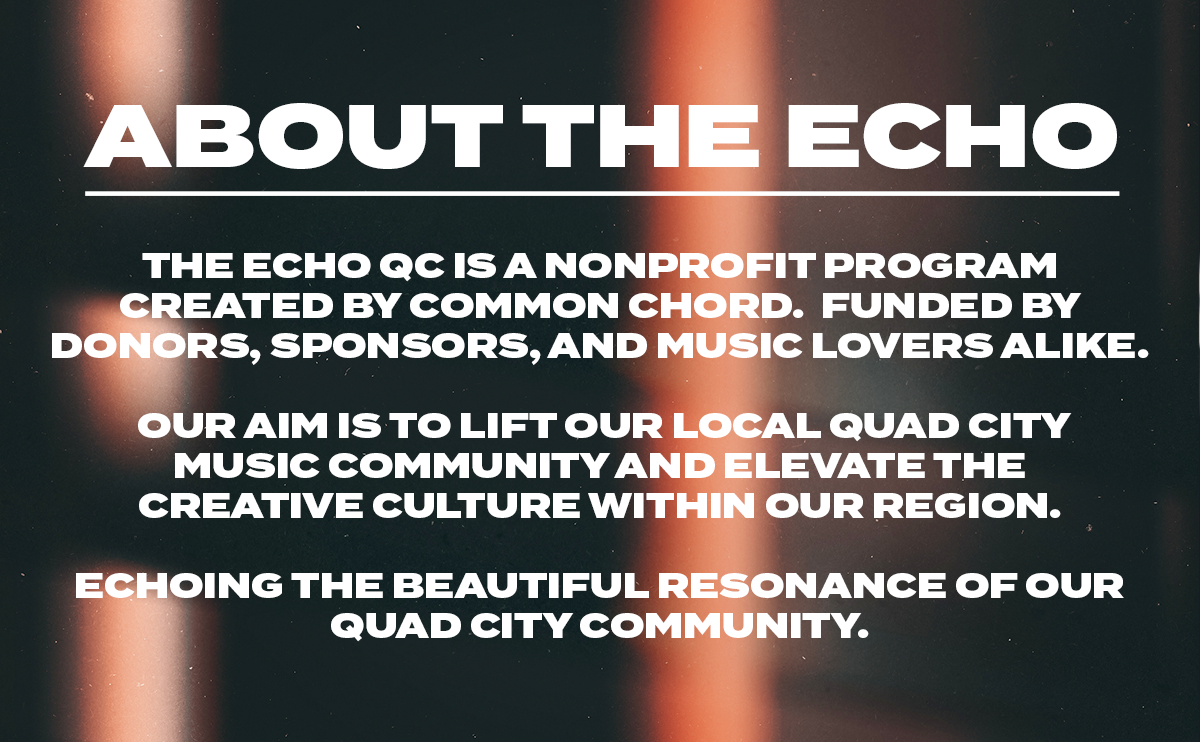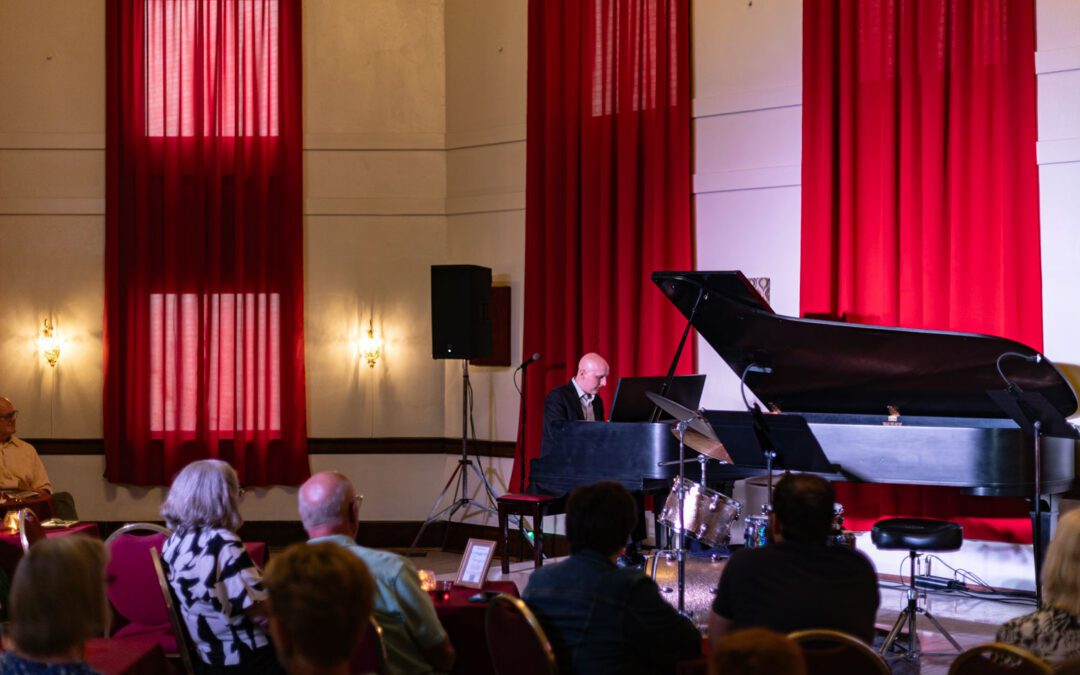ABOUT THIS SERIES:
This is an insider’s peek into live music venues in the Quad Cities area, with a specific focus on venues whose audience capacity is below 500. The series aims to highlight the vibrant, diverse music scene in the Quad Cities and shed light on the more intimate venues that are often overlooked.
By highlighting venues with an audience capacity below 500, the series aims to showcase the intimate and personal experiences that these venues provide. We acknowledge that larger venues, and bars often dominate the music scene conversation with either touring musicians or cover bands, and seek to shed light on the charm and character of the Quad Cities’ smaller music venues.


TRADING PERIODICALS FOR PIANO KEYS:
Sound Conservatory Creates Its Own Carnegie Hall in Downtown Moline
Photographed & Written by: Matthew Terry

The name Carnegie has a lasting position in US history, and you’d be hard-pressed to find an American who hasn’t at least heard the name. Andrew Carnegie had a major hand in the development of this country in the 19th and early 20th centuries, for both good and ill.
His business practices inspired one of the most popular board games of the past century, while also changing how the U.S. approached the control companies were allowed to possess. While these resulted from less-than-ideal practices, he also used his unimaginable fortune to establish Carnegie Hall, a true American landmark of musical performance, along with over 1,600 libraries.
At one point in 1919, nearly half the libraries in the country were Carnegie libraries, including one that opened in downtown Moline in 1904, staying in operation until 2008. While this neoclassical structure still has his name emblazoned across its entrance, the bookshelves have long been removed.
Combining two things so heavily related to the steel magnate (a music hall/performance space and one of the libraries that bears his name), in late 2023 Sound Conservatory and owner Andrzej Kozlowski took over this space; trading past publications for piano keys. Kozlowski, a native of Poland who spent a lot of his time in New York, even studying at the famous Julliard school, has said that the historical nature of the QCA is a big factor of what initially drew him here, so it’s only fitting that he would eventually find himself in a space rooted so deeply in the local and national narrative.

While this old library sat empty for over a decade along a road that has carried countless coughing cars through downtown Moline, it gained renewed life, albeit one far less silent than these walls were used to. Sound Conservatory – which most recently operated out of a space on 5th Avenue in downtown Rock Island after originally opening on 3rd in 2022 – faced an uncertain future when the building that held this music store/academy/performing arts space found itself beyond repair, pushing them out of Rock Island in the process.
Of course, such a quick and necessary move was daunting, to say the least. The Renew Moline organization helped get Kozlowski into this space with nearly 4,000 more square footage than their last location. This allows for enough room to accommodate a performance space that hosts several events a month, a retail music store that features far more than pianos/piano accessories, a showroom, and teaching studios, all of which are aimed at inspiring and increasing a musical community that already has a storied history.

Moline is no stranger to a shift in scenery, and with so many buildings and spaces getting removed or rearranged during the new I-74 bridge construction it is reassuring to see such a historical piece of the city get a new existence as opposed to being lost, becoming but a memory to a future time. Kozlowski prefers utilizing such a historic building, as this building which houses the musical arts is a piece of art itself.
Without many exceptions, any building, especially one with more than a century of experience, is going to have hurdles, but it’s no surprise that Kozlowski, a veteran in the tedious and delicate world of piano repair and rebuilding, would also find himself working similarly to revive this historical structure. Much like a piano, this relic from a rising time in US history has its “bones” and a vast series of moving and static parts that all must work congruently otherwise it won’t resonate as it should – showcasing that even the most seemingly delicate pieces can combine to produce an undeniable strength.

This strength is clear the minute you set eyes on the building, which was built at least a decade before anyone I’ve personally met in my lifetime. The grandiose nature of this nod to neoclassical architecture greets you with a quartet of massive stone columns and ornate fixtures, illuminating a grand staircase that ushers people inside, beyond the well-dressed revelers standing upon the steps during intermission singing their praises and commenting on how they didn’t know such sounds could be experienced here in the cities where the Mississippi bends but refuses to break.
The main performance space (which holds up to 200 for fully seated events and 150 when it includes a few tables) was sold out for the celebration of famed American composer George Gershwin. With crimson-tinged drapes bleeding over windows stretching up towards the ceiling, this vaulted space truly allows room for the music to expand upon itself, making sure there isn’t a bad seat in the house.

Kozlowski takes a lot of pride in what Sound Conservatory offers to an area that is endlessly hungering for new sights and sounds in the musical realm. They are the largest local piano dealer, offering affordable prices in addition to a piano rental program. These types of programs are pivotal for people just diving into musical expression, and as a grade school child first finding interest in playing an instrument in band (saxophone), a similar rental program from another small local retailer was the only way my parents could make this happen. Musical instruments aren’t cheap and Kozlowski recognizes that, doing what he can to help make them accessible to anyone interested in pressing those keys or pushing strings down onto a fretboard for the first time. They even partner with local schools and the Boys & Girls Clubs of the Mississippi Valley, offering scholarships, instrument/lesson giveaways, in addition to helping educate the younger generation on not only classical music, but also exposing them to the tools responsible for creating those classics.
They’ve even joined forces with local artists for a program called Keys of Unity where pianos are painted and displayed at local businesses, adding a unique twist to this mix of wood and strings while promoting and supporting the local arts in the process. The piano presently on display in their “Carnegie Music Hall” was created by Regan Hatfield, who you’ve likely seen painting during one of Common Chord’s live music events. Local intuitive painter/artist Miranda Vavrosky (Vavrosky Art) is covering another piano in acrylics which is set to be finished and ready to showcase by Sound Conservatory this Fall.

Sound Conservatory found its new location in the vibrant and growing arts hub of downtown Moline. This place has more art and music options per capita than practically anywhere in the area, including plays, improv, and musical performances from locals and legends alike. Sound Conservatory has brought in Grammy-winning artists as part of their concert series, and there are not many places you can catch world-class musicians with less than 200 others only a few blocks away from an arena that has been a “mark” for major Grammy-winning acts visiting The Quad Cities for decades.
Sound Conservatory proves that much like the transition of winter to spring, sometimes an ending is truly the sign of better things to come.
Venue Name: Sound Conservatory
Website: www.soundconservatory.com
Venue Address: 1504 17th Street (At the Carnegie Library) Moline, IL 61265
Facebook: www.facebook.com/soundconservatory
Instagram: www.instagram.com/soundconservatory/






